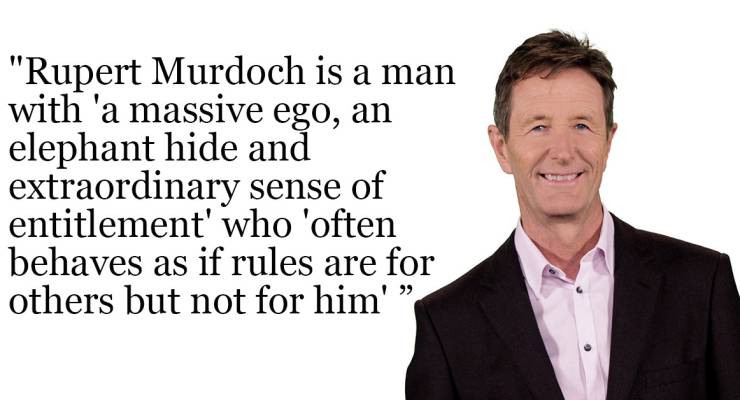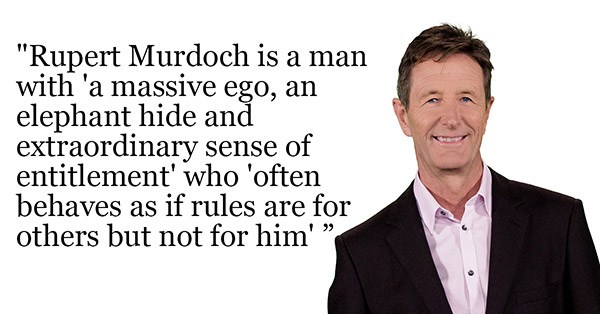
“Writing about Rupert Murdoch and his family is perhaps not a great career move, given that they have such power and patronage in the media in Australia, the UK, the US and rest of the world.” When Paul Barry wrote those words, in his 2013 book Breaking News: Sex, Lies and the Murdoch Succession, he was prophetically charting his own fate at the hands of the the Murdoch family and their editorial retainers. Since then, Barry has become one of the highest-ranking public enemies on News Corp’s wanted list.
In many ways Barry is the prototypical target for The Australian:
- He’s employed by the ABC (public broadcasting is detested by Murdoch and therefore his employees);
- He hosts ABC TV’s Media Watch (media critique is detested by News Corp chiefs because, as owners of so much media, they are among its main targets);
- He wrote a book about News Corp’s UK phone-hacking scandal (a subject Murdoch and his lieutenants despise and try to ignore); and
- He’s part of the inner-city media elite (speaks with a plummy British accent and is publicly condescending towards the excesses of tabloid journalism).
Although Barry’s book was almost completely ignored in The Australian when it was first published, it was clearly tucked away for future reference. And it just added to the reasons (not least as host of Media Watch) he became (and still is) the target of a vitriolic Australian Holy War. News articles, opinion columns, blogs and editorials regularly attack Barry’s motives, referencing the book as evidence of his bias against News Corp.

Barely six months after Barry assumed the Media Watch chair, The Australian‘s then editor-in-chief, Chris Mitchell, in an interview with his own paper, called for nothing less than Barry’s removal from the program. “His constant harassment of News Corp is analogous to cash for comment. And I note Paul was quite happy to take Rupert’s money when he needed a job and worked for The Sunday Telegraph only a couple of years ago.”
The next year, an Australian editorial accused Barry of making “a career out of hostility to the Murdoch family”, referred to his book as a “jaundiced monograph” and demanded that Barry and Media Watch “come clean on the agendas that drive them”.
But the trigger for The Australian‘s Holy War against Barry was when he put an incorrect figure ($40 million to $50 million) on the paper’s loss in the previous financial year. This was clarified when Mitchell, for the first time, confirmed those losses, for that year, were actually around $30 million. It was an imbroglio that sparked an avalanche of stories, as well as two complaints from The Australian to the TV regulator ACMA (both dismissed).
The Australian also used the issue to write more stories, this time about whether the Media Watch apology was sufficient, prompting a new (short-lived) column called “ABC corrections” in the paper, where it provided its own corrections for slights or errors it discovered on the national broadcaster.
Stories included an “investigation”, which commissioned media-monitoring company Isentia to analyse Barry’s tweets for bias against the News empire, supported visually by sending a photographer get a pap shot of Barry outside the ABC building in Sydney after a coffee run. Another article conducted a count of stories about News Corp run on Media Watch. In-house talking heads Mitchell and CEO Nicholas Gray provided validation for the stories.
In another tactic straight out of its Holy Wars manual, The Australian sent a journalist to cover a talk Barry gave at a Politics in the Pub event in the Sydney suburb of Glebe, reporting the important event under the headline: “Barry has faint praise for Murdoch empire”.
Over the past few years, Paul Barry has been a one-man case study that shows how News Corp is a state-within-a-state operating by its own set of rules. This revelation should have been no surprise to him. As Barry wrote in Breaking News, Rupert Murdoch is a man with “a massive ego, an elephant hide and extraordinary sense of entitlement” who, despite an old-fashioned morality, “often behaves as if rules are for others but not for him”.
TOMORROW: Ethics and The Australian
*Editor’s note: Paul Barry is a very small, passive shareholder in Private Media, publisher of Crikey.








Crikey is committed to hosting lively discussions. Help us keep the conversation useful, interesting and welcoming. We aim to publish comments quickly in the interest of promoting robust conversation, but we’re a small team and we deploy filters to protect against legal risk. Occasionally your comment may be held up while we review, but we’re working as fast as we can to keep the conversation rolling.
The Crikey comment section is members-only content. Please subscribe to leave a comment.
The Crikey comment section is members-only content. Please login to leave a comment.